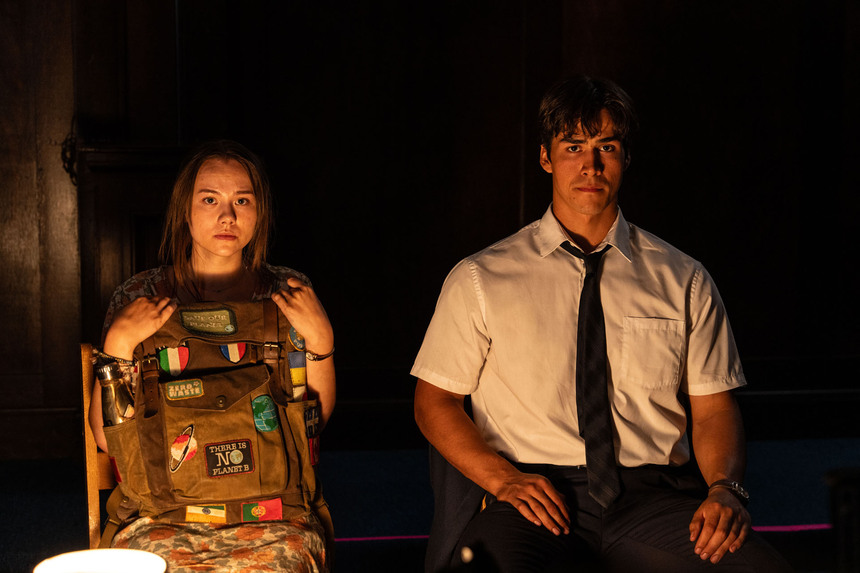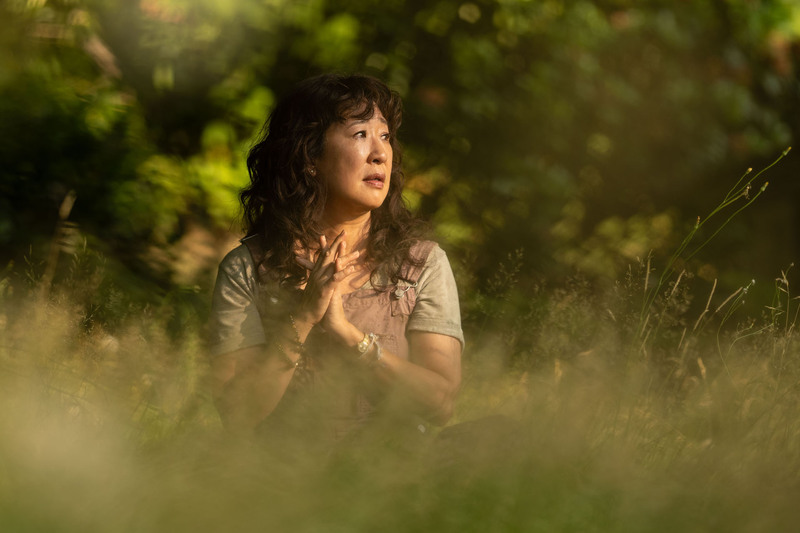CAN I GET A WITNESS? Review: A Fable of Sacrifice & Remembrance

Two big questions often follow us through our lives on this planet: how long will we be here, and will anyone remember us when we're gone. Much of philosophy and art is devoted to understanding the importance of these questions in our lives, though naturally most of us would like to be alive as long as we can. How, and if, we will be remembered, is another. And one that has more relevance in a world that humans are irreparably damaging, and lives lived increasingly alone.
Ann Marie Fleming grapples with these large questions in Can I Get a Witness? A fable of the future, it's a quietly moving and intimate portrait of a changed world where peace and a future have been obtained, though with quite a steep price.
The film begins by setting itself as a fable, which is important to remember, as Fleming asks the audience to accept a big premise. Some decades in the future, it seems that the world has achieved ecological stability, and equal, steady prosperity for the planet. No one wants for shelter, food, health care, or education. But that contentment and steadiness comes at a cost: everyone has agreed to voluntary suicide at the age of 50. Kiah (Keira Jang) is about to have her first day on the job as a 'documentor', drawing pictures of people in their End-of-Life (EOL) ceremony, following in the footsteps of her mother Ellie (Sandra Oh). She and her mentor Daniel (Joel Oulette) will spend the day either notifying people that they must start to plan, helping people choose what their EOL ceremony will be, or witnessing their end.
For the young like Kiah, it's almost unfathomable that the world would be otherwise; not surprising, given she is young, and doesn't understand nostalgia, or wanting to see what else life can bring with the (hopefully) wisdom of age. She is still unsure of the world, whereas Daniel is committed to those whose EOL he facilitates; he finds his kind yet efficient professionalism challenged by Kiah, who, upon witnessing some of these ceremonies, slowly begins to understand what it means to say goodbye to the world before you want to. Kiah might have a bit of the sullen teenager vibe, but she's still had to grow up faster than she should, coming in a world where she's got a lot less time than we do now. But making the most of every minute is not the same, and it seems far more plausible in a world where you don't have to fight to survive.
Fleming and her team do an exceptional job to build the world of this film. Everyone gets around, at least locally, by bike, skateboard, or on foot (cars and other vehicles only as absolutely needed). Since digital images degrade, sketches and pictures are more popular. People learn to create their own power, recycle most everything, art is analog, the music and movies are old since vinyl and old film prints have outlasted blu rays and mp3's. It's clearly not an Eden, however; there is a sense of restrictions on people's movement, how many children a person can have, and the necessity to perform either civil or military service. Quite frankly, it's a tempting world to be in, even considering its conditions.
 In the 36 hours of the story's time, we see how the world seems quite calm and peaceful. No noisy cars, no struggle to the rat race, no fears of disaster or struggle to survive. Again, this is a fable, and Fleming is inviting the audience to contemplate what it means to be alive, and what it means to sacrifice, if such a near-perfect world could be achieved. What if we found that balance between the more 'futuristic' technology that we only absolutely need, and the slower, yet more fulfilling daily existence, that would allow all of us to be well and whole. Would it be worth a smaller population, a mainly younger population? What would we be willing to sacrifice, truly, to achieve what we need in order to heal the planet and humanity.
In the 36 hours of the story's time, we see how the world seems quite calm and peaceful. No noisy cars, no struggle to the rat race, no fears of disaster or struggle to survive. Again, this is a fable, and Fleming is inviting the audience to contemplate what it means to be alive, and what it means to sacrifice, if such a near-perfect world could be achieved. What if we found that balance between the more 'futuristic' technology that we only absolutely need, and the slower, yet more fulfilling daily existence, that would allow all of us to be well and whole. Would it be worth a smaller population, a mainly younger population? What would we be willing to sacrifice, truly, to achieve what we need in order to heal the planet and humanity.
The three central performances feel like three stages of life, three stages of understanding in this world created by Fleming, as to how we should approach and understand that sacrifice, and what and how we want to remember the past. The questioning of Kiah and how she is now beginning to understand the new way needed to be human; the earnestness of Daniel, already having lost and finding a way to cope in a different kind of community; the acceptance and sadness of Ellie, knowing what the world was before and how it must be.
With Can I Get A Witness?, piece by piece, Fleming and her cast construct this fable as a framing for how we might understand our own current turbulent times, if we can look at what might be possible. Not literally with this fableistic EOL, but how we might understand and undertake what we owe to each other. Beautifully shot by C. Kim Miles, it's a fable that takes its time to unfold, despite taking place over only two days, we're meant to understand how much can be seen and felt in a brief passage of time and what it means to be remembered in the world.
Can I Get a Witness? opens in Toronto and Montreal on Friday, March 14th, Ottawa on Friday, March 21st, expanding to other cities in Canada in the spring.
Can I Get A Witness
Director(s)
- Ann Marie Fleming
Writer(s)
- Ann Marie Fleming
Cast
- Sandra Oh
- Cassandra Sawtell
- Andre Anthony







